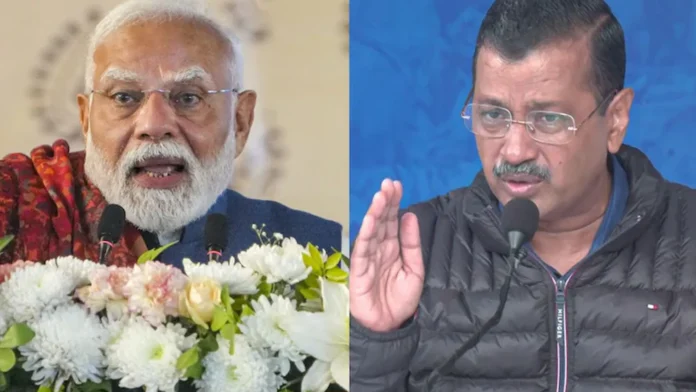January 5, 2025: Arvind Kejriwal’s sharp remarks against Prime Minister Narendra Modi reflect the intensifying political battle between the Aam Aadmi Party (AAP) and the Bharatiya Janata Party (BJP) as the 2025 Delhi Assembly elections approach. Kejriwal’s accusations are a direct counter to PM Modi’s recent jibe at the Delhi government, where he referred to the AAP as the “AAP-DA,” implying that the party has failed in delivering on its promises.
Kejriwal’s response was both pointed and personal. He lashed out at the BJP for not fulfilling its promises to the people of Delhi, specifically in the area of land reforms, and took a strong stand on the unfulfilled promises made in 2020, such as the abrogation of Sections 81 and 33 of the Delhi Land Reforms Act and the implementation of the land-pooling policy. He highlighted how these promises had yet to be realized, which, according to him, had left the residents of “Delhi Dehat” (rural areas of Delhi) frustrated and disillusioned. Kejriwal’s words, “The whole of ‘Delhi Dehat’ is waiting to take revenge on the BJP,” are designed to rally the rural voters who have felt left out by the lack of progress from the Centre.
The Delhi CM also took aim at the BJP’s rhetoric, accusing Modi of repeatedly attacking the people of Delhi and the elected AAP government, while failing to deliver on key promises. Kejriwal stressed that despite such personal attacks and political maneuvering, AAP had focused on development, citing the inauguration of new metro and rapid rail lines as examples of his government’s work for the city. His mention of AAP not resorting to “vendetta politics” despite its leadership facing legal troubles is aimed at presenting AAP as a party that works for the people rather than engaging in tit-for-tat politics.
Kejriwal’s comments also underscore a sense of growing discontent among Delhi’s residents with the BJP-led Centre, particularly in relation to promises made in the past. The land-pooling policy, which Kejriwal said had been delayed since 2018, has been a point of contention, as its non-implementation has been seen as a failure to address the settlement issues in unauthorized colonies. For Kejriwal, these unfulfilled promises speak to the larger issue of trust between the Delhi electorate and the BJP.
In contrast, PM Modi’s “AAP-DA” remark during his rally in Rohini was a deliberate attempt to paint the Delhi government as a failure, characterizing its governance as a “tragedy.” Modi’s call for a “developed Delhi” is part of the BJP’s broader campaign to take credit for the city’s development and to position the party as the better alternative for the future. His appeal to the people of Delhi to give BJP a chance in the 2025 elections is a clear attempt to challenge the AAP’s dominance, especially after the latter’s massive victory in the 2020 assembly elections, where AAP secured 62 out of 70 seats.
However, Kejriwal’s remarks regarding the expansion of Delhi Metro under AAP’s government are a strong counter to Modi’s criticism. By emphasizing that the Delhi Metro has expanded by 200 km and that work is ongoing for an additional 250 km, Kejriwal is showcasing his government’s achievements in infrastructure—something that directly impacts the daily lives of Delhi residents. His assertion that these developments came despite political persecution and the challenges posed by the BJP-led Centre serves to paint AAP as the party of the people, focused on tangible outcomes rather than political one-upmanship.
The backdrop of these exchanges is the impending 2025 Delhi Assembly elections, where AAP will seek to maintain its stronghold and prove that its governance model can continue to deliver results. With BJP hoping to make significant inroads, particularly by capitalizing on any discontent among Delhi’s electorate, this political showdown is bound to intensify in the coming months.
The fact that Congress, once dominant in Delhi, has failed to secure any significant presence in recent elections, only adds to the stakes. For Kejriwal, the battle is not just with the BJP but also with the historical narrative of Congress’s governance. His leadership, which has seen AAP grow in popularity across Delhi, will be tested again as voters assess whether AAP’s promises of development and good governance continue to resonate, or whether they are willing to give the BJP a shot at redemption.


